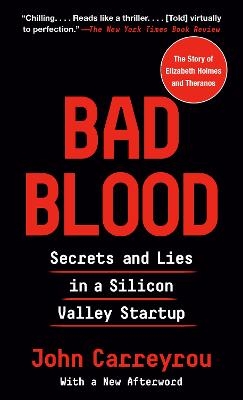
Bad Blood
Vintage Books (Verlag)
978-0-593-08164-8 (ISBN)
A New York Times Notable Book
A Washington Post Notable Book
One of the Best Books of the Year: NPR, San Francisco Chronicle, Time, Esquire, Fortune, Marie Claire, GQ, Mental Floss, Science Friday, Bloomberg, Popular Mechanics, BookRiot, The Seattle Times, The Oregonian, Publishers Weekly, Library Journal
In 2014, Theranos founder and CEO Elizabeth Holmes was widely seen as the next Steve Jobs: a brilliant Stanford dropout whose startup "unicorn" promised to revolutionize the medical industry with its breakthrough device, which performed the whole range of laboratory tests from a single drop of blood. Backed by investors such as Larry Ellison and Tim Draper, Theranos sold shares in a fundraising round that valued the company at more than $9 billion, putting Holmes's worth at an estimated $4.5 billion. There was just one problem: The technology didn't work. Erroneous results put patients in danger, leading to misdiagnoses and unnecessary treatments. All the while, Holmes and her partner, Sunny Balwani, worked to silence anyone who voiced misgivings-from journalists to their own employees.
Rigorously reported and fearlessly written, Bad Blood is a gripping story of the biggest corporate fraud since Enron-a tale of ambition and hubris set amid the bold promises of Silicon Valley.
John Carreyrou, a two-time Pulitzer Prize winner, was a reporter at The Wall Street Journal for twenty years. For his extensive coverage of Theranos, Carreyrou was awarded the George Polk Award for Financial Reporting, the Gerald Loeb Award for Distinguished Business and Financial Journalism in the category of beat reporting, and the Barlett & Steele Silver Award for Investigative Business Journalism. Bad Blood was named the Financial Times and McKinsey Business Book of the Year. Carreyrou lives in Brooklyn, New York, with his wife and three children.
Prologue November 17, 2006 Tim Kemp had good news for his team. The former IBM executive was in charge of bioinformatics at Theranos, a startup with a cutting-edge blood-testing system. The company had just completed its first big live demonstration for a pharmaceutical company. Elizabeth Holmes, Theranos's twenty-two-year-old founder, had flown to Switzerland and shown off the system's capabilities to executives at Novartis, the European drug giant. "Elizabeth called me this morning," Kemp wrote in an email to his fifteen-person team. "She expressed her thanks and said that, 'it was perfect!' She specifically asked me to thank you and let you all know her appreciation. She additionally mentioned that Novartis was so impressed that they have asked for a proposal and have expressed interest in a financial arrangement for a project. We did what we came to do!" This was a pivotal moment for Theranos. The three-year-old startup had progressed from an ambitious idea Holmes had dreamed up in her Stanford dorm room to an actual product a huge multinational corporation was interested in using. Word of the demo's success made its way upstairs to the second floor, where senior executives' offices were located. One of those executives was Henry Mosley, Theranos's chief financial officer. Mosley had joined Theranos eight months earlier, in March 2006. A rumpled dresser with piercing green eyes and a laid-back personality, he was a veteran of Silicon Valley's technology scene. After growing up in the Washington, D.C. area and getting his MBA at the University of Utah, he'd come out to California in the late 1970s and never left. His first job was at chipmaker Intel, one of the Valley's pioneers. He'd later gone on to run the finance departments of four different tech companies, taking two of them public. Theranos was far from his first rodeo. What had drawn Mosley to Theranos was the talent and experience gathered around Elizabeth. She might be young, but she was surrounded by an all-star cast. The chairman of her board was Donald L. Lucas, the venture capitalist who had groomed billionaire software entrepreneur Larry Ellison and helped him take Oracle Corporation public in the mid-1980s. Lucas and Ellison had both put some of their own money into Theranos. Another board member with a sterling reputation was Channing Robertson, the associate dean of Stanford's School of Engineering. Robertson was one of the stars of the Stanford faculty. His expert testimony about the addictive properties of cigarettes had forced the tobacco industry to enter into a landmark $6.5 billion settlement with the state of Minnesota in the late 1990s. Based on the few interactions Mosley had had with him, it was clear Robertson thought the world of Elizabeth. Theranos also had a strong management team. Kemp had spent thirty years at IBM. Diane Parks, Theranos's chief commercial officer, had twenty-five years of experience at pharmaceutical and biotechnology companies. John Howard, the senior vice president for products, had overseen Panasonic's chip-making subsidiary. It wasn't often that you found executives of that caliber at a small startup. It wasn't just the board and the executive team that had sold Mosley on Theranos, though. The market it was going after was huge. Pharmaceutical companies spent tens of billions of dollars on clinical trials to test new drugs each year. If Theranos could make itself indispensable to them and capture a fraction of that spending, it could make a killing. Elizabeth had asked him to put together some financial projections she could show investors. The first set of numbers he'd come up with hadn't been to her liking, so he'd revised them upward. He was a little uncomfortable with the revised numbers, but he figured they were in the realm of the plausible if the company executed perfectly. Besides, the venture capitalists startups cour
| Erscheinungsdatum | 14.01.2020 |
|---|---|
| Verlagsort | New York |
| Sprache | englisch |
| Maße | 105 x 174 mm |
| Gewicht | 215 g |
| Themenwelt | Wirtschaft ► Betriebswirtschaft / Management ► Finanzierung |
| Wirtschaft ► Betriebswirtschaft / Management ► Unternehmensführung / Management | |
| Schlagworte | amazon best sellers books list 2019 • best books of 2019 • best nonfiction books of 2019 • best sellers list new york times 2019 • Biotechnology • Blood • business • Business book • business books • Economics • economics books • economy • finance books • his and hers gifts • Innovation • MONEY • new york times best sellers • Nonfiction • Non Fiction • non fiction books • non fiction books best sellers • ny times best sellers • Science • Start up • Startup • Steve Jobs • Strategy • tech gifts for men • Technology • the inventor • top 10 business books • top books • True Crime • true crime books • Venture Capital |
| ISBN-10 | 0-593-08164-1 / 0593081641 |
| ISBN-13 | 978-0-593-08164-8 / 9780593081648 |
| Zustand | Neuware |
| Haben Sie eine Frage zum Produkt? |
aus dem Bereich


